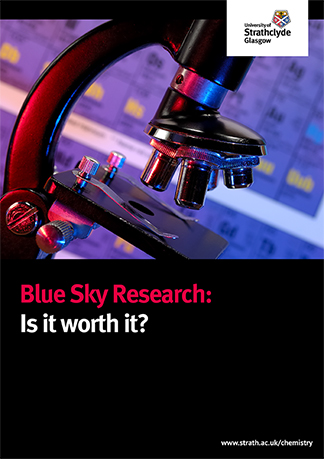In his latest ebook, Professor Colin Suckling of the University of Strathclyde tackles the question: Is there any evidence that the cumulative output of research over the last 50 years has been valuable?
Professor Suckling asks whether blue sky research is worth it. How can we possibly know in advance which research will turn out to have commercial or social value?
The thing about research, as Albert Einstein remarked, is that if we knew what the outcomes were going to be, it wouldn’t be research. Still less can we be sure in advance what research might turn out to be transferable into useful outcomes. In Victorian times, Michael Faraday was challenged that his research on electrical phenomena would not lead to anything important. So, it’s not a new question, but one that periodically recurs.
Blue sky research for medicine
Research at the University of Strathclyde engages with organic chemistry, medicinal chemistry, chemical biology, pharmaceutical sciences and many biological sciences. Professor Suckling and his colleagues there are currently investigating anti-infective compounds to treat bacterial and parasitic infections in humans and animals; the most advanced compound has successfully completed a phase 1 clinical trial for treating Clostridium difficile infections, while several others have achieved proof-of-concept, in particular for treating African animal trypanosomiasis.
Compounds to treat inflammatory disease are similarly effective in models of arthritis, asthma, lupus and lung fibrosis, for example. When cancer is added to this list you have a good idea of the potential impact of what we are doing. This new ebook follows various approaches to research and how to choose the correct approach for a specific disease.


